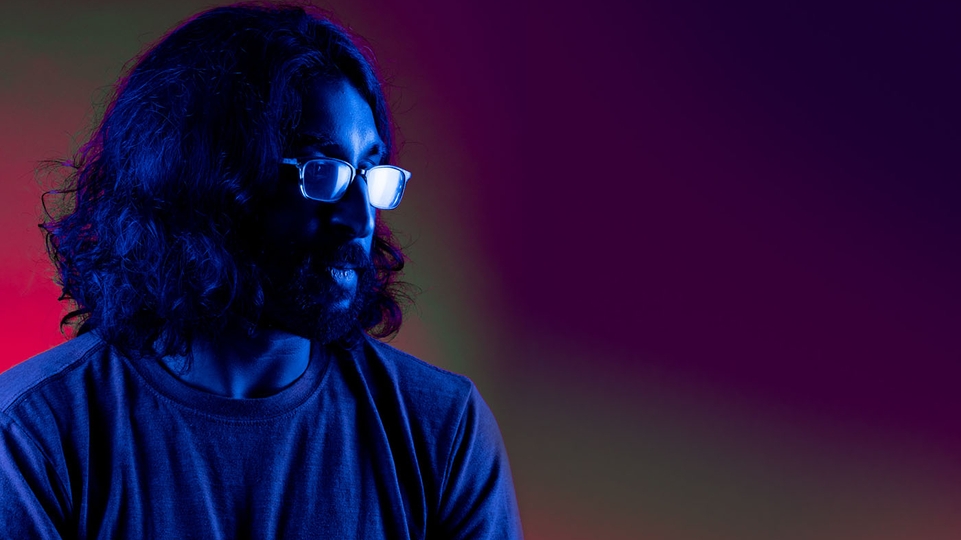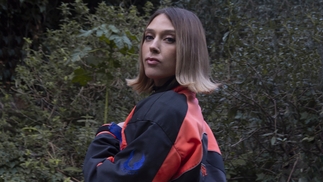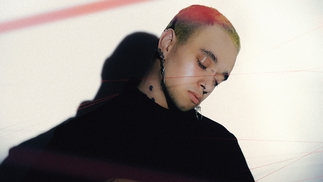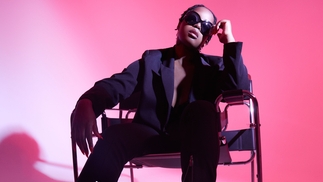Recognise: Nikki Nair

With sizzling electro, crunching breakbreats, frenzied footwork and much more in between, Nikki Nair records a jaw dropping productions mix for the Recognise series, and chats to Katie Thomas about his route into music-making and DJing, the importance of respecting dance music history, and the push for a more diverse scene
In February 2020, before the world came to a standstill, Nikki Nair landed in the UK for the first time. He was there to play his first ever UK shows, starting with the iconic main room at Ministry of Sound, alongside Nocturnal Sunshine (aka Maya Jane Coles), Ejeca b2b Addison Groove, Asquith and Chloé Robinson (then Barely Legal), who was hosting a party for her label Pretty Weird.
“I thought that was the peak of my DJ career,” Nair tells DJ Mag now over a video call. “I got to go and play with these people I’ve listened to for a long time, at a club I never thought I’d get to play at. Now when I’m old I can tell some young person at a bar that I did that, and I’ll be happy.”
During his time in the UK, Nair experienced the polar ends of clubbing in London: the pizazz of an institution like Ministry of Sound, and a dark, low-ceilinged rave in the intimate Rye Wax basement. Having played two such different spaces, what makes the perfect party? Being eye level with the dancefloor for one, he says. “I like when it’s a tenuous situation for me,” he laughs, “when there are people who could touch the CDJs and are looking right in my eyes.”
Nikki Nair has had a fruitful few years. Following a debut in 2018 on Partial Magic, where his track ‘Murder My Balls’ appeared alongside friend and mentor Alex Falk, Nair’s fiery and disparate sounding releases have since landed via Scuffed Recordings, TRAM Planet, Gobstopper and Dirtybird. He also holds down a residency on Refuge Worldwide, and has just revealed an official remix of ‘Back Together’, an Amorphous track featuring Kehlani. It’s a silky garage cut that shows another side to Nair’s production, which has already run the gamut from dark and weird to bright and buoyant: writhing acid, whomping basslines, banging techno, moody breakbeats, electro, four-to-the- floor house, and AC Slater-flavoured fidget house — you name it, Nikki Nair has probably done it.

Before he was remixing pop stars and releasing on some of dance music’s most exciting underground labels, Nikki Nair grew up in Knoxville, Tennessee, before moving to Atlanta last year. Growing up in an Indian household, much of the music he heard was Bollywood or Carnatic, until around seven, when he found pop videos on MTV and VH1. A few years down the line, during middle school, Nair got into Flash cartoons by David Firth (the creator of Salad Fingers). Some of Firth’s weirder videos were accompanied by experimental electronic soundtracks, and it was here that Nair discovered Aphex Twin, Boards Of Canada and Squarepusher.
A keen drummer, Nair played in bands throughout school, but it never stuck — mostly due to regularly getting into trouble and thus being grounded, meaning he’d miss too much band practice and suffer cut-throat replacement. After realising he could be his own band by recording instruments over one another with cassette players, Nair learned he could do the same on a computer, eventually progressing to FruityLoops. “I didn't show many people that music,” he says, “I just kept making weirder and weirder stuff, so that by the end of high school, I had hours and hours of tracks.”
Options for Nair to go out and hear electronic music in his hometown were limited, but friends introduced him to drum & bass producer Dieselboy, the first person he ever saw DJ. It wasn’t until after college that Nair took an interest in DJing himself, following a chance meeting with Detroit legend Mike Banks in Submerge Records during Movement Festival. “He was telling us about the history of how dance music evolved there,” he says, “about the story of Underground Resistance and stuff. I became obsessed after that.”
However varied his productions sound, Nair thinks his primary influence always comes back to the Detroit techno that Mike Banks took the time to teach him about: the likes of Underground Resistance, Jeff Mills and Drexciya. Banks helped him form an initial understanding about how politics and dance music intertwine, and the importance of acknowledging the historical context of the scene and its originators. “There is the aspect of respecting culture,” says Nair, “but something people forget is that you get much better at an art if you understand the language.”
He uses etymology as an example: if you want to better your command of English, you’ll benefit from understanding Latin, German, and learning the roots of words, phrases, and idioms. “How people consume dance music is so contextual and has to do with the cultural subconscious of music,” he says. “So much meaning comes from the history, so if you miss that as a producer, your tracks aren’t going to be as good.”
Soon after that instrumental conversation in Detroit, Nair got involved with the TEKNOX crew in Knoxville, a bi-monthly party founded by Falk and DJ Dialectic Sines. “I kept going to their parties and someone was like, ‘You like this music so much, and you’re even producing it. Why aren’t you DJing?’” he says, “so that was when it became a thing.”

But growing up in a South Asian family, from a young age Nair was taught that becoming a musician wasn't an option. “As much as I loved making music,” he explains, “it was totally unreasonable and ridiculous for me to think about doing professionally.” For a while, Nair thought if he could just get one track released on vinyl, this compulsion to make music might make way for “a real job”. “Sometimes I still feel like that,” he says, “of all my cohort of Indian kids growing up, I'm the shittiest one. I'm not a doctor, I haven't been to Princeton, and I haven’t started a Fortune 500 company. What am I doing?”
In the same breath, Nair acknowledges the privilege of being able to pursue music (even if his parents might be holding out for a career change). “I got to live in the US, be exposed to this culture, and learn about music from a young age,” he says, “I'm sure if I had grown up in India it would have been 10 times harder.” It's for this reason, he says, that he has utmost respect for the Indian artists busy revolutionising their dance music scene.
In recent months in the UK, South Asian artists have been enjoying some much- deserved celebration in the press. But the integrity of the coverage has been criticised on Twitter: these artists have been on the grind and great at what they do for a long time, so why now? Is it because there’s money to be made? “It makes me sad,” says Nair, “if they had been interested before, I might have taken up music professionally at a younger age. People like me missed out on this South Asian music culture in the UK that is so deep and self-created.”
It’s something he would like to see more of, as well as pushes for diversity that extend beyond the underground and into commercial dance music too. As someone who is noticeably careful about their choice of words, here Nair worries aloud that he’ll say something that doesn’t make sense. His point is loud and clear: “The commercial side in the US is still pretty white, backwards, and boring,” he says. “The parties are not inclusive, and that makes them dangerous. And the music sucks! Those things are not only correlated, but there is also causation.” A lack of diversity makes for “wack” music, Nair says, and that’s because the best music is born from cultural fusions; he names jazz, jungle and Punjabi garage to stress his point.
Looking ahead in his own career, Nair hopes to create positive change in the US dance music landscape. He has short-term goals — labels he wants to hit, production techniques he wants to perfect — but he also says that goal-making is something he’s thinking about actively. We think we know why that is: Put out music on vinyl? Check. Play a show outside his hometown? Check. Quit his day job? “Hopefully soon.” Nikki Nair is making new goals, because the old ones keep becoming a reality.
Listen to Nikki Nair's Recognise mix below.
Tracklist:
Nikki Nair 'unreleased'
Nikki Nair 'unreleased'
Nikki Nair 'unreleased'
Nikki Nair & ALXZNDR 'unreleased'
Nikki Nair ‘Scuzzy’ [Pretty Weird]
Nikki Nair 'unreleased'
Nikki Nair 'unreleased'
Addison Groove ‘Brand New Drop’ (Nikki Nair Remix) [Gutterfunk]
Nikki Nair ‘[snake emoji]!’ [Discovery Recordings]
Nikki Nair 'unreleased'
Nikki Nair ‘Something’ [Dirtybird]
Nikki Nair ‘Buggy’ [Juke Bounce Werk]
Nikki Nair 'unreleased'
Nikki Nair ‘Trunk’ [Scuffed Recordings]
Nikki Nair 'unreleased'
Nikki Nair 'unreleased'
Ciel & Ali Berger ‘I've Been Reaching (Nikki Nair Remix)’
Nikki Nair 'unreleased'
Nikki Nair ‘Pah’ [Worst Behavior]
Nikki Nair 'unreleased'
Kamus ‘Wallace (Nikki Nair remix)’ [Céad]
Nikki Nair 'unreleased'
Nikki Nair ‘Socket’ [Dirtybird]
Sean Paul ‘Like Glue (Nikki Nair edit)’





